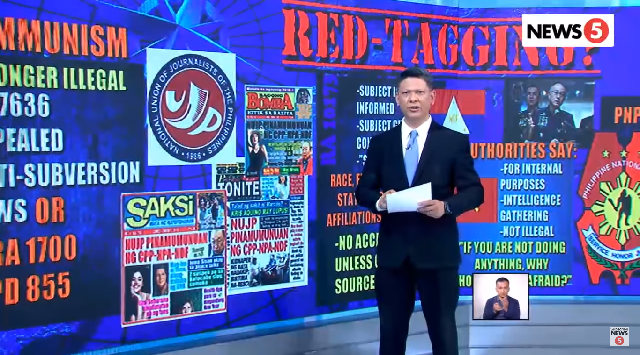Against “Red-tagging”: Media Provide Needed Context

Screengrab from News5Everywhere’s Youtube account.
LAST JANUARY 7, the Philippine National Police (PNP) confirmed that they were gathering intelligence on members of the Alliance of Concerned Teachers (ACT), a progressive organization of teachers and education workers. A leaked memorandum had ordered the police to make an inventory of those affiliated with ACT, including their personal details. On the same day, three tabloids carried banner stories with identical headlines declaring that the National Union of Journalists of the Philippines (NUJP) is headed by the Communist Party of the Philippines-New People’s Army-National Democratic Front (CPP-NPA-NDF).
These incidents happened two weeks after the president’s directive to “destroy the CPP” and its “legal fronts.” Both ACT and NUJP have been critical of the current administration’s policies. Police claim that ACT is under surveillance as part of its counter-insurgency measures. Meanwhile, the Armed Forces of the Philippines branded NUJP as one of the “enemies of the state” in their 2006 presentation “Knowing the Enemy,” which the military is still using today.
Most of the media limited their reports to the statements of the groups involved, missing the necessary explanation why the profiling of the two organizations is dangerous. CMFR cheers TV5’s Aksyon and Philstar.com as exceptions.
Aksyon’s explainer “Red-tagging” recalled former President Gloria Macapagal-Arroyo’s “all-out war” against the Communist insurgency in 2006, during which leftist organizations were directly linked to the NPA, resulting in the killing of activists by unidentified suspects. The report also explained that the Data Privacy Act has strict provisions on the release of sensitive information such as age, religion and affiliations. The same law prohibits government employees and workers from accessing personal information, unless they have been given clearance by the source agency.
TV5’s explainer and Philstar.com’s report both provided crucial information: that being “Left” is not a crime, because Philippine laws on subversion have long been repealed. Republic Act 1700, or the Anti-Subversion Act of 1957, and Presidential Decrees 885 and 1835 of Ferdinand Marcos penalized those who joined or were affiliated with the CPP or any similar organization.
Philstar.com added, “The Anti-Subversion Law was repealed in 1992 because of the perceived infringement on the constitutional rights of an individual.”
Atty. Jacqueline de Guia, the spokesperson of the Commission on Human Rights, told Philstar.com that no court order has declared ACT as a terrorist organization. De Guia added that the police should pursue cases based on clear evidence. She said, “It is dangerous to cover infringement of rights with a veil of legality, which could lead to many forms of abuses, including harassment, breach of privacy, restriction of free movement, and even detention without charges.”
This context would help correct the inclination of some Filipinos to regard any Leftist tendencies or sympathetic leanings for Communist ideology as deserving of judicial examination and even punishment, and thus accept red-tagging. This outlook is harmful to the development of intellectually vigorous political discourse.
Dissent is essential to a working democracy. The independent press has to remind its audience of that fact as attempts to discredit various groups critical of the current regime continue, rather than just report statements of public officials condemning the politics of the Left and publicly naming those they see as “Red.”
Leave a Reply